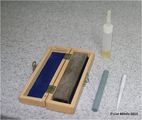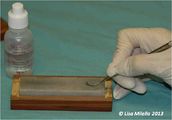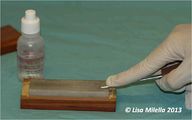Dental Equipment Maintenance - Small Animal
Sharpening
Scalers, curettes, luxators and elevators all require regular sharpening. Dental instrument sharpening kits (stones and oil), with instructions, are available through veterinary wholesalers. Scalers and curettes should be sharpened before each use, i.e. after cleaning and sterilization. Sterilization blunts the instruments and sharpening of dirty instruments can contaminate the sharpening stone. Sharpening is performed to retain the 70–80° angle between the face and the lateral surface of the working tip. Luxators and elevators need to be sharpened regularly, usually after each use, with a cylindrical Arkansas stone. The tip of the elevator should be sharpened on the convex side, whilst the luxator should be sharpened on the concave side. If either have damage to the working end they should be professionally reground.
Maintenance of Power Equipment
Ultrasonic Scalers:
All scaler tips eventually become worn and less efficient and can become a potential cause for iatrogenic damage to the tooth surface. Some manufacturers have printed cards to measure the tip against to indicate when the tip should be replaced. The tip should also always be replaced if it becomes bent or damaged.
Scaler tips should be autoclaved after each use. If only one tip is available, the tip should be cleaned with a chemical disinfectant between patients during the working day and then sterilized at the end of the day.
Handpieces:
Check manufacturers instructions for specific care instructions. All handpieces should be wiped down and then autoclaved after use. The handpieces should also be oiled regularly. Disconnect the handpiece from the air and water supply line. To lubricate the handpiece place a few drops of oil in the air inlet hole at the botton of the handpiece (this is usually the smaller of the 2 holes). Both slow and high speed hand pieces should be oiled regularly.
Compressor:
Some compressors are oil-free, but if not, the oil level should be checked prior to use. The compressor should be relieved of pressure daily after use. Once a week any fluid that has accumulated should be drained from the air reservoir. There is a valve on the bottom of the compressor. Place a collection bowl below the valve as there will often be a large amount of fluid that has accumulated and needs to be drained.
| This article was written by Lisa Milella BVSc DipEVDC MRCVS. Date reviewed: 13 August 2014 |
| Dental Equipment Maintenance - Small Animal Learning Resources | |
|---|---|
To reach the Vetstream content, please select |
Canis, Felis, Lapis or Equis |
| Endorsed by WALTHAM®, a leading authority in companion animal nutrition and wellbeing for over 50 years and the science institute for Mars Petcare. |
Error in widget FBRecommend: unable to write file /var/www/wikivet.net/extensions/Widgets/compiled_templates/wrt699fc58b3d20d9_98450096 Error in widget google+: unable to write file /var/www/wikivet.net/extensions/Widgets/compiled_templates/wrt699fc58b453064_26422595 Error in widget TwitterTweet: unable to write file /var/www/wikivet.net/extensions/Widgets/compiled_templates/wrt699fc58b4ba924_23330670
|
| WikiVet® Introduction - Help WikiVet - Report a Problem |




